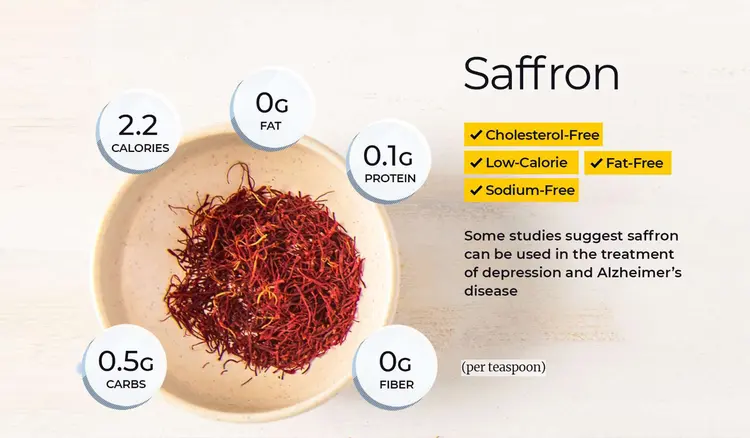The Nutritional Facts Of Saffron: Red Saffron Stigmas Consist Of Many Nutritious Things
Saffron is a highly nutritious superfood rich in essential vitamins, minerals, and antioxidants, offering numerous health benefits. This highly sought-after spice is known for its unique flavor, aroma, and medicinal properties. Consuming Saffron can help improve digestion, boost the immune system, and reduce inflammation. Its potent antioxidant properties can also help protect the body against free radical damage, which can lead to chronic diseases. Incorporating Saffron into your diet can be a great way to promote optimal health and wellness. You can feel good about enjoying this natural superfood and all the goodness it brings to the table.
100 grams of all red Saffron consists of:
|
(Source: USDA National Nutrient database) |
||
|
Principle |
Nutrient Value |
Percentage of RDA |
|
Energy |
310 Kcal |
15.50% |
|
Carbohydrates |
65.37 g |
50% |
|
Protein |
11.43 g |
21% |
|
Total Fat |
5.85 g |
29% |
|
Cholesterol |
0 mg |
0% |
|
Dietary Fiber |
3.9 g |
10% |
|
Vitamins |
|
|
|
Folates |
93 µg |
23% |
|
Niacin |
1.46 mg |
9% |
|
Pyridoxine |
1.010 mg |
77% |
|
Riboflavin |
0.267 mg |
20% |
|
Vitamin A |
530 IU |
18% |
|
Vitamin C |
80.8 mg |
135% |
|
Electrolytes |
|
|
|
Sodium |
148 mg |
10% |
|
Potassium |
1724 mg |
37% |
|
Minerals |
|
|
|
Calcium |
111 mg |
11% |
|
Copper |
0.328 mg |
37% |
|
Iron |
11.10 mg |
139% |
|
Magnesium |
264 mg |
66% |
|
Manganese |
28.408 mg |
1235% |
|
Phosphorus |
252 mg |
36% |
|
Selenium |
5.6 µg |
10% |
|
Zinc |
1.09 mg |
10% |
Hamed Biglari
Assistant Professor of Environmental Health Engineering in Gonabad University of Medical Sciences, Razavi Khorasan, Iran




Your Comment
Required fields*